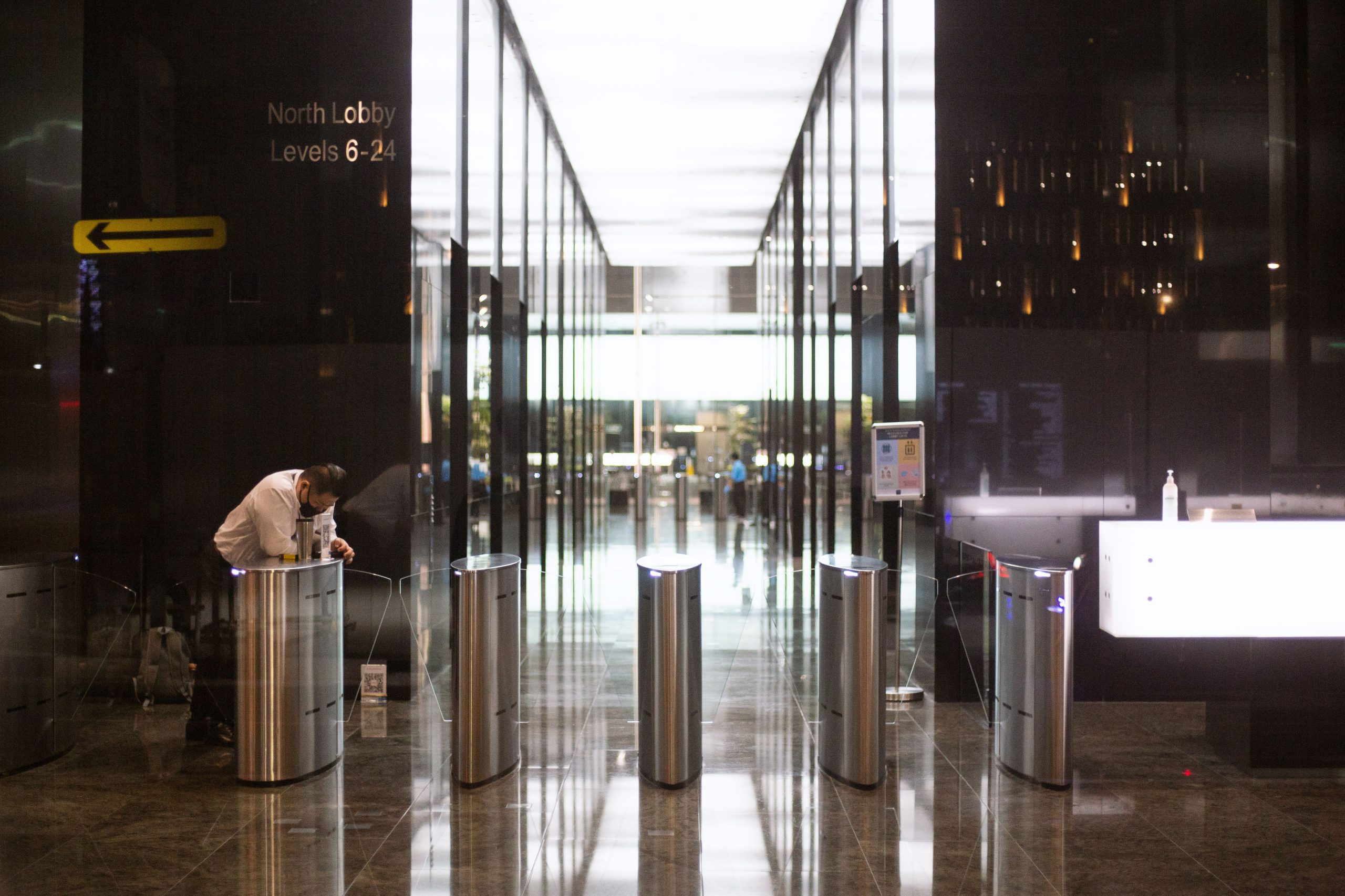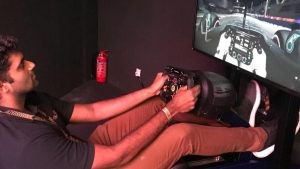Top image: Zachary Tang/RICE File Photo
There’s this feeling I am running from. You’ll know it when I explain. Picture this: I am watching my colleagues say brilliant things at our weekly Zoom meeting. They are stacked on top of each other in Brady Bunch squares. Throughout the call, I have been monitoring them. Someone’s dog barks. Another mutes their mic to sneeze. The new intern selected a rainbow as their virtual background.
I’m grateful to share in their minutiae.
When the pandemic first happened my friends in other industries told me how happy I was, how a remote setup was so neatly conducive to my passion and trade as a writer. I thought: yes, how happy I am.
Okay, so my colleagues are still talking from their squares but now, my editor is winding up the call. Some people come alive, blinking excitedly and preparing to wave goodbye. Others are as nonchalant as when we started, staring blankly off to the side. My heart thumps. My palms are sweaty. I am looking at all of my colleagues and wondering what they will do next. Lunch, perhaps? Or maybe a nap? Or will they send memes on Slack?
Then, the screen goes blank. Is it dramatic to say that I am bereft each time it happens? Something is gone in the ether. A connective tissue between me, my work, and my colleagues. Most of the time, I am sluggish while working from home. A good conversation with a colleague—no matter how trivial—can turn that around. The more I seek out good conversations, the worse the feeling gets when the screen goes blank.
Tapping and clicking
I travelled at the end of last year. Aside from two days for my birthday and a cold, I hadn’t taken a break in 2021. What was the point? I was at home, anyway. I might as well work. Or so I thought at the time. I saved up all my annual leave for a much-needed visit to Ireland with family that I haven’t seen for two years. In Dublin, I went for a walk down an old pier with an old friend. As I tried not to trip in the cracks between the well-worn cobblestones, our talk turned to work.
My friend is an ad-hoc physiotherapist. Every day at work is different. Sometimes she assists post-op patients with their first steps. Occasionally, she helps geriatric patients with their mobility. The point is that she’s constantly moving. Her progress is measurable: when a patient takes more steps than yesterday, or an old person’s mobility care plan moves to conditioning after pain relief, she knows her efforts matter.
As we strolled, I explained how I’d been working from home for the bulk of my career. “You know what I just realised?” She paused for the eureka moment, holding her coffee up like a trophy.
“Your job is just tapping and clicking.”
For some reason, this off-the-cuff joke triggered a shift in me.
What, pray tell, is the value of tapping and clicking all day long? Surely it’s not high. Surely a monkey could do my job. Surely monkeys could do most of our jobs. For the next few days, I spiralled. At the bottom of the spiral, I found a delayed realisation: work itself, in any sector of the PMET class, is meaningless.
I don’t mean that my work (or yours) has no value. Just that it’s non-essential. Especially compared to my friend, the physiotherapist. The world wouldn’t end if I stopped tapping and clicking. But some old people would be very less mobile without my friend’s work. Also, it’s hard to build an identity around a PMET gig. How many of us can call our work a vocation, or our life’s purpose?
Life coaches, your boss, and your MP might try and convince you that who you are is what you do for your paycheck. Perhaps they take it a step further and argue that specific industries have ‘desirable characteristics’ which you can cultivate by signing up for their webinar. They are lying. It’s advantageous to perpetuate this lie, and most of us are wise to the truth by now.
When you strip away the human parts of work—lunch with your favourite coworkers, office gossip, mutual enemies, collaboration—there is a simple answer to why we tap and click all day. Because it’s something that other people do. Because for most of us there is no alternative.
This is a convoluted way to arrive at my unpopular opinion, which is that we need the office. Not in its pre-pandemic manifestation, but an iteration of it. Of course, there will be cases where this is not applicable, desirable, or helpful, but in my experience, there is no point in suffering unless I can do it with others.
I am less good at tapping and clicking when siloed. Misery loves company, etc, etc.
The C-word
To defend IRL work, I’m eschewing arguments for or against remote productivity. I don’t really care if you (or me, or anyone else) is productive. I’m talking about some good old individualistic rhetoric: how can working feel more bearable for me, so that my tapping and clicking is less existentially difficult?
Enter the c-word, connection. I used to turn my nose up at this. It reminded me of LinkedIn jargon. But that’s exactly what remote work saps from my psyche—the sense that I’m a cog in a larger social group that cares whether I am there or not. Apparently, it takes a village to tap and click.
I reached out to Simone Heng, who makes her living speaking on human connection, to learn more about sociability and its purpose in the workplace. Firstly, she offered a neat rebuttal to some feedback I anticipate on social media from this op-ed.
“If you work in a toxic environment, then, of course, going back into the office is not ideal. I worked for a horrible boss, with bitchy colleagues for many years. If remote work was an option back then, it would be a dream come true.”
So, part of the blowback to IRL office work seems to come from people who either don’t like their jobs or work in a toxic environment. I’d argue that if your work is so insufferable and demanding that you can’t bear to be in the office even in a hybrid environment, perhaps it’s time to start looking elsewhere. Any social environment should feel—if not uplifting and supportive—safe and healthy.
It’s okay to dislike some coworkers, or aspects of other people’s working styles. But if you truly can’t bear to interact with your team IRL, you’re dealing with a problem that goes beyond the WFH debate.
Maybe I’m biased but I’m more likely to feel that my work has a purpose and value when I’m in regular face-to-face contact with my colleagues. I like the camaraderie.
I said this to Simone and then I described the feeling I feel when a Zoom call ends. She named it loneliness and posited that sociability combats it.
“Everyone’s need for connection is different. Often, I hear introverted people saying they need no social interaction. I don’t think that’s true. We’re evolutionarily inclined to seek groups and belonging. You can only push away that instinct for so long.”
And besides, it’s not just deep and profound connections that keep the happy hormones zipping through your brain. Small and casual interactions can fill the connection void too.
“Think about your small relationships in the office. Perhaps it’s a nod while passing someone in the hall. Or a smile from your favourite barista at the coffee shop on your way to work. Or maybe it’s a coworker tapping you on the shoulder for a quick chat just when you’re feeling fatigued. These interactions keep you going.”
Digital alienation
Video conferencing sucks. As I mentioned earlier, I feel more empty after a Zoom call than I felt before on my own at my desk in my bedroom.
“Virtual connection is like the junk food of human connection. Satisfying momentarily, but it doesn’t satiate us in the long run.” Simone said when I described this feeling.
In fact, there’s plenty of ongoing research on digital alienation and its consequences. ‘Zoom fatigue’ is a pandemic phenomenon—caused by the unnatural challenges that video conferencing poses for us. Excessive eye contact, limited mobility, and seeing yourself on-screen constantly, create a virtual burnout and a disconnection from the self that is hard to treat without a healthy dose of human interaction.
Fiona Maher, a registered psychologist and co-owner of InContact Singapore, mentioned that her clients will go out of their way to avoid digital therapy, partly because of this Zoom fatigue.
“It just doesn’t fill the void. People who are anxious and depressed—and there are a lot more of them now—need to feel connected. They’d rather wait for an in-person availability in our office rather than proceed online.”
In my view, this digital alienation has not led to a positive change in my work-life balance. Firstly, there’s the expectation that you’re always on. Because we’re all digital, people are more comfortable contacting me outside of office hours when I shouldn’t be working. And frankly, that goes both ways. I’ve found it hard to switch off.
Additionally, before WFH became the default, I was intentional with my free time. Because it was limited by the time I spent in the office—I had to prioritise making space for the rituals that filled me up: exercise, happy hour with friends, family dinner, etc.
But now I’m in a toxic relationship with my computer. She makes me feel bad, but I keep coming back, scrolling for hours, eating into my newfound ‘free time’, and then wondering where it went.
Reimagining the workplace
I’m grateful to work at a company where IRL work sounds palatable. I recognise, however, that not everyone feels the same. Still, I’m not sure that a movement like the great resignation in the US would translate to Singapore. We’re more risk-averse, and certainly are very concerned about our rice bowls.
In lieu of a great resignation, perhaps we’ll see employees voting with their feet—shifting jobs and industries depending on the working conditions and the remote setup. We’ve seen this most recently from our junior lawyers.
So, the onus is on the employer to implement structural changes to make a hybrid office setup more appealing and less stressful. It seems the hybrid model (with the tools to go fully digital, just in case) is the future of work. Though there are roadblocks to actualizing a dynamic setup fully—temperamental technology, half in-person half-virtual meetings, and the costs of maintaining a physical space that is mostly unused.
TLDR; I tap and click, I miss my colleagues, I hate my computer.






